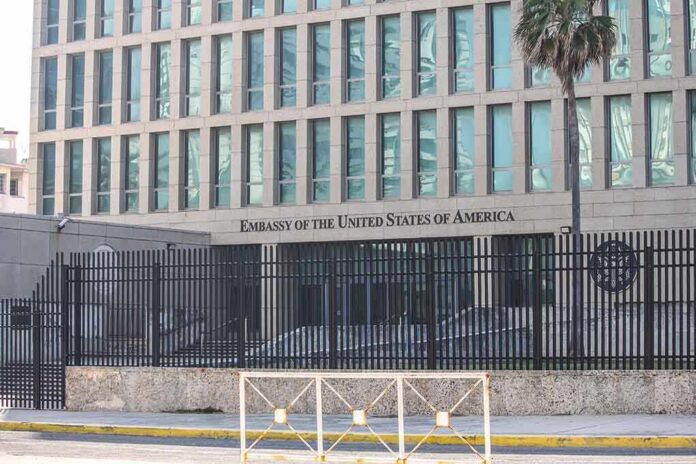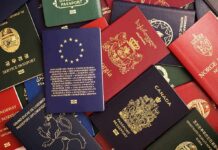U.S. embassies across Europe and Canada have begun issuing unprecedented travel warnings to visa holders as the Trump administration implements stricter immigration enforcement, leaving thousands of travelers unsure if their valid documents will actually get them into the country.
Quick Takes
- At least 17 European countries and Canada have issued travel advisories warning citizens about increased deportation risks when traveling to the U.S.
- Border officials have detained and deported individuals despite having valid visas, particularly targeting those involved in political demonstrations.
- The U.S. has suspended the policy allowing transgender, intersex, and nonbinary people to use the X marker on passports.
- Officials emphasize that visas are “privileges, not entitlements” and valid documentation doesn’t guarantee entry.
- Travelers are advised to carry thorough documentation and be prepared for electronic device searches at ports of entry.
International Warnings on U.S. Travel Surge
Countries including Denmark, the United Kingdom, Germany, Finland, and Canada have updated their travel advisories for citizens planning trips to the United States. Unlike previous warnings that typically focused on gun violence concerns, these new advisories specifically address immigration enforcement risks. The warnings follow multiple incidents where foreign nationals with valid documentation were detained or deported at U.S. ports of entry. The advisories represent a significant shift in how America’s closest allies are approaching travel to the United States during the current administration.
Germany’s Foreign Office explicitly warns its citizens that entry through ESTA or a visa does not guarantee admission to the U.S., while the United Kingdom states travelers may be “liable to arrest or detention” if they don’t comply with all entry requirements. Canada has instructed citizens that those staying longer than 30 days “must be registered with the United States Government.” Denmark and Finland have updated guidance on gender markers in travel documents, noting the U.S. now only recognizes two sexes in official documentation.
Home
Today's Fastrack
About
Subscribe
Travel Ban 2.0: Trump Targets 43 CountriesTravel Ban 2.0: Trump Targets 43 Countries
author
The Frank Staff
1 hours ago·
3 min readShare
Comment
0
President Donald Trump's administration is considering…
— Wilda V. Heard (@drWilda) March 15, 2025
U.S. Embassies Launch Social Media Warning Campaign
U.S. embassies across Europe have launched a coordinated social media campaign to warn potential visitors about behavior that could lead to deportation. The warnings feature images of key administration figures including President Donald Trump, Secretary of State Marco Rubio, and Homeland Security Secretary Kristi Noem. These notices emphasize that valid visas do not guarantee entry or continued stay in the United States, particularly highlighting that those who engage in protest activities or express certain political views may face consequences.
According to State Department spokesperson Tammy Bruce, “Follow the law, behave yourselves, be a good visitor and you’ll be fine. It’s a visa. It’s not an entitlement. A visa and a green card are not birthrights. These are privileges you’re granted … because of what you present to the United States.”
International students and professors, particularly those involved in protests related to the Gaza conflict, have found themselves targeted by the stricter enforcement. Several cases have emerged of students having their visas revoked despite maintaining good academic standing. The State Department has emphasized that visas are privileges granted to those who follow U.S. laws, not entitlements that can be maintained regardless of behavior during a stay in the country.
Heightened Scrutiny at U.S. Borders
Customs and Border Protection officers have broad authority to deny entry to foreign nationals, even those with seemingly valid documentation. Recent incidents have shown increased scrutiny of electronic devices, with some travelers denied entry based on social media content or messages found during border searches. Green card holders, international students, and H-1B visa holders have reported facing more extensive questioning about their activities and plans while in the United States.
“Foreign nationals who promote extremist ideologies or carry terrorist propaganda are inadmissible to the U.S., plain and simple. A visa does not guarantee entry; CBP has the final authority after conducting rigorous security checks,” said assistant commissioner of public affairs at U.S. Customs and Border Protection Hilton Beckham.
Immigration attorneys recommend that travelers carry comprehensive documentation of their eligibility to enter the U.S., ensure they’re in full compliance with all immigration requirements, and consult with legal counsel if they’ve previously been arrested. Travelers should also prepare for the possibility of electronic device searches, which CBP can conduct without a warrant. The enforcement changes affect everyone from tourists to business travelers, with particular impacts on those from countries issuing travel warnings.
Economic Impact Remains Uncertain
The economic impact of these travel advisories remains unclear, though some tourism experts express concern about potential declines in travel and spending from Western Europe. Prior to these immigration-related warnings, international travel to the U.S. had been recovering from pandemic-era restrictions. While most authorized travelers continue to be admitted without issue, the unpredictability of the entry process has led some business travelers and tourists to reconsider their plans.
Secretary of State Marco Rubio said, “This is not about free speech. This is about people that don’t have a right to be in the United States to begin with. No one has a right to a student visa. No one has a right to a green card, by the way. So, when you apply for a student visa or any visa to enter the United States, we have a right to deny you for virtually any reason.”
The Trump administration maintains that these enforcement efforts are necessary to ensure that visitors respect American laws and regulations. Secretary of State Marco Rubio has emphasized that the administration doesn’t want people in the country “that are going to be committing crimes and undermining our national security or the public safety.” The State Department notes that these measures align with the president’s focus on border security and immigration enforcement.
Sources:
- https://www.npr.org/2025/03/22/nx-s1-5336792/european-countries-canada-travel-warnings-us
- https://apnews.com/article/us-embassies-social-media-campaign-visas-warning-299373f23528db0fcd86a7511126893e
- https://www.mintz.com/insights-center/viewpoints/2806/2025-03-24-travel-advisories-foreign-nationals-entering-united
- https://www.newsweek.com/visa-travel-embassy-deportation-trump-immigration-2050148











